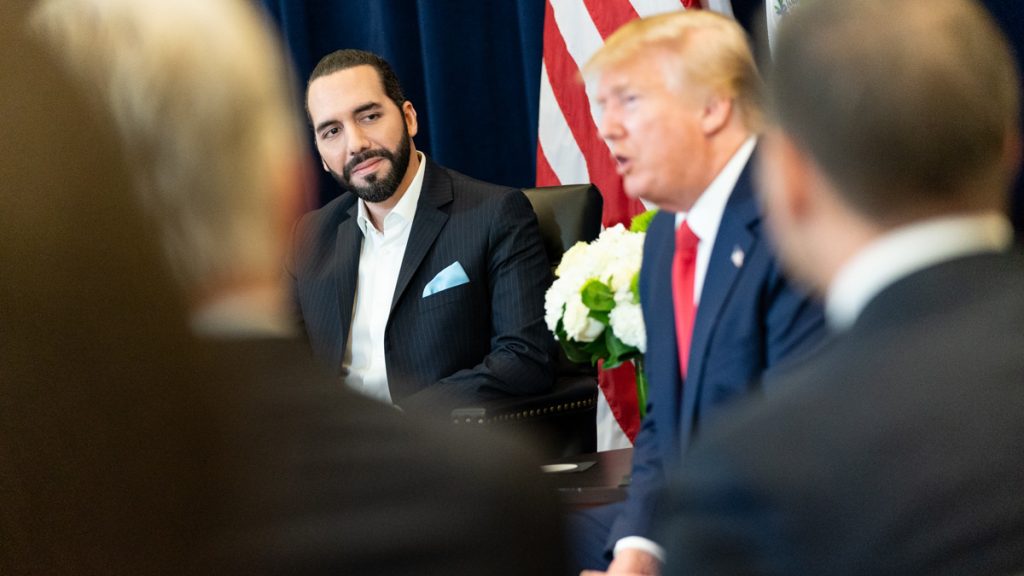Following the indictment of former President Donald Trump on March 30, 2023 by a Manhattan grand jury, president of El Salvador Nayib Bukele had choice words for this decision.
Bukele took to Twitter to speak his mind about this development. He tweeted:
The Salvadoran president added:
Trump’s indictment was centered on payments he made in his first presidential run in 2016 to muzzle allegations of an extramarital sexual encounter he had with porn star Stormy Daniels. This recent development has rekindled discussions about the United States’ institutional stability in the long-term as otherwise partial government bodies have become more politicized over time.
On Bukele’s part, this is just the latest episode of contrarian actions he has taken since assuming the presidency in 2019.
Geopolitics & Empire has previously covered the mercurial president of El Salvador and his willingness to buck geopolitical trends. Of all the leaders on the world stage, the 41-year-old president has one of the most intriguing profiles.
In 2019, Bukele was elected as a reform candidate who has set out to clean up corruption and combat crime. It shouldn’t be forgotten that in 2015 El Salvador had recorded 6,657 homicides, which placed its overall murder rate at a horrific 104 per 100,000 people. This figure made it the most murderous country in 2015.
Historically, El Salvador has been plagued by large degrees of criminal activity. The Central American country has been host to transnational street gangs such as MS 13 and Barrio 18 that have terrorized Salvadoran and even American citizens through their acts of drug trafficking, extortion, human smuggling, kidnappings, and murder.
Curiously, crime in El Salvador has plummeted significantly in the last 8 years. According to government figures, El Salvador boasted only 496 homicides in 2022, which is about 57% less than 2021’s homicide total. Bukele’s tough on crime measures have largely contributed to this decline in homicides. In late 2022, El Salvador entered a state of emergency in response to an uptick of homicides connected to gang activity. So far in this state of emergency regime, the Salvadoran government has detained approximately 62,900 individuals.
One of the most high-profile aspects of this war against crime, is the Bukele government’s use of mass incarceration. The Salvadoran government recently rolled out a mega prison designed to house about 40,000 prisoners. Dubbed the “Center for the Confinement of Terrorism”, the construction of this prison is the latest effort by the Salvadoran government to clamp down on criminal activity.
Predictably, the non-governmental industrial complex has criticized Bukele’s tough anti-crime measures. For example, Human Rights Watch has singled out Bukele’s state of emergency which it asserts has granted his government the power to carry out “arbitrary arrests, enforced disappearances, torture and other ill-treatment of detainees, and significant due process violations.”
Curiously, Bukele responded to the massive international wave of criticism of his mega-prison project by tweeting “The United States Government is putting PROVEN INNOCENTS in jail and is, at the same time, concerned about us putting PROVEN CRIMINALS in jail.” In this instance, he was referring to how the US government has incarcerated hundreds of individuals connected to the January 6, 2021 protests. Several commentators have argued that a substantial number of these protestors have been unjustly incarcerated.
Bukele’s willingness to criticize the US in these instances show not only a boldness on his part to challenge the world’s premier superpower, but also a growing chink in the US’s armor. As the US grows more despotic at home, it will lose its ability to credibly claim that it’s a champion of human rights and freedoms. More nations like El Salvador will start openly criticizing the US and may even look to alternative nations like Russia or China as strategic and economic partners.
As witnessed in the case of Iran and Saudi Arabia normalizing diplomatic relations, more and more nations are beginning to lose trust in the US for a multitude of reasons. For one, it has a track record of fomenting instability abroad through color revolutions, military interventions, sanctions, and other forms of subversion. Moreover, with the US growing more unstable economically and institutionally, the US’s otherwise pristine imagine will be called into question by more nations.
After all, how can a country talk about spreading democracy and stable governance abroad when it can’t even get its political house in order. Rest assured, Nayib Bukele won’t be the last of international leaders who will begin to question the US’s credibility as a champion of civil liberties and liberal democracy.
Should the US continue down its path of woke authoritarianism it will find itself isolated on the world stage.

